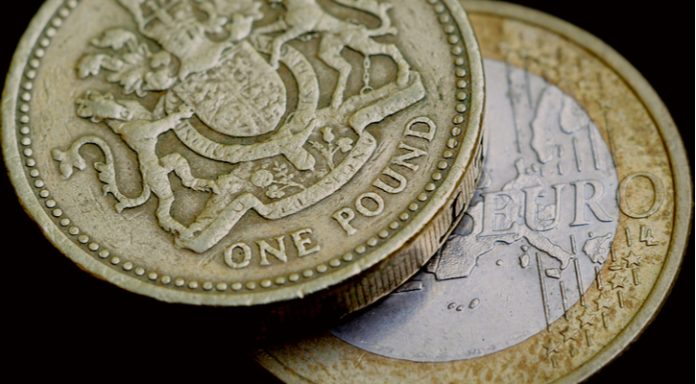The pound traded evenly versus the euro on Wednesday. With both the pound and the euro in demand, the two currency pairs were evenly matched. The pound euro exchange rate ended the previous session at €1.1482, close to its six-month high.
| What do these figures mean? |
|---|
| When measuring the value of a pair of currencies, one set equals 1 unit and the other shows the current equivalent. As the market moves, the amount will vary from minute to minute.h If the euro amount increases in this pairing, it’s positive for the pound. Or, if you were looking at it the other way around:1 EUR = 0.87271 GBPIn this example, €1 is equivalent to approximately £0.87. This measures the euro’s worth versus the British pound. If the sterling number gets larger, it’s good news for the euro. |
Hopes of a Brexit deal, in addition to housing data that beat analysts’ forecasts boosted demand for the pound. Rumours have been circulating throughout the week that a Brexit deal is just days away from being completed. Even following denials from both the UK Prime Minister’s office and from EU Chief negotiator Michel Barnier, the rumours have continued. Leading economists and business leaders have continually stated the damage that they believe a no deal Brexit would cause the UK economy. Therefore, on any suggestions that a deal is close to being achieved, the pound rallies.
| Why is a “soft” Brexit better for sterling than a “hard” Brexit? |
|---|
| A soft Brexit implies anything less than UK’s complete withdrawal from the EU. For example, it could mean the UK retains some form of membership to the European Union single market in exchange for some free movement of people, i.e. immigration. This is considered more positive than a “hard” Brexit, which is a full severance from the EU. The reason “soft” is considered more pound-friendly is because the economic impact would be lower. If there is less negative impact on the economy, foreign investors will continue to invest in the UK. As investment requires local currency, this increased demand for the pound then boosts its value. |
The house price report from the Halifax also supported the pound. The Halifax housing report showed that house prices increased by more than what analysts were expecting in October, despite this being close to a five year low. Whilst pound traders are not directly interested in the price of houses, the fact that the UK consumer is willing to pay more for a house than what analysts predicted shows a higher level of consumer confidence. This is encouraging for the pound.
Today with little on the UK economic calendar, Brexit will however remain the key driver for the pound.
ECB Economic Calendar In Focus
Demand for the euro was strong in the previous session. A Democrat win for the House of Representatives in the US midterm elections dragged the US dollar lower. Given that the euro tends to trade inversely to the US dollar, the euro rallied.
The single currency was also supported by encouraging economic data. Firstly German Industrial production grew by 0.8% year on year in September. This was ahead of the 0.5% estimated by analysts and also a marked improvement on Augusts’ -0.1% decline. The stronger numbers boosted the euro.
| Why does strong economic data boost a country’s currency? |
|---|
| Solid economic indicators point to a strong economy. Strong economies have strong currencies because institutions look to invest in countries where growth prospects are high. These institutions require local currency to invest in the country, thus increasing demand and pushing up the money’s worth. So, when a country or region has good economic news, the value of the currency tends to rise. |
Today the European Central Bank published its Economic Bulletin. This will attract attention, particularly following the weaker GDP reading last week.
This publication is provided for general information purposes only and is not intended to cover every aspect of the topics with which it deals. It is not intended to amount to advice on which you should rely. You must obtain professional or specialist advice before taking, or refraining from, any action on the basis of the content in this publication. The information in this publication does not constitute legal, tax or other professional advice from TransferWise Inc., Currency Live or its affiliates. Prior results do not guarantee a similar outcome. We make no representations, warranties or guarantees, whether express or implied, that the content in the publication is accurate, complete or up to date. Consult our risk warning page for more details.
This article was initially published on TransferWise.com from the same author. The content at Currency Live is the sole opinion of the authors and in no way reflects the views of TransferWise Inc.





